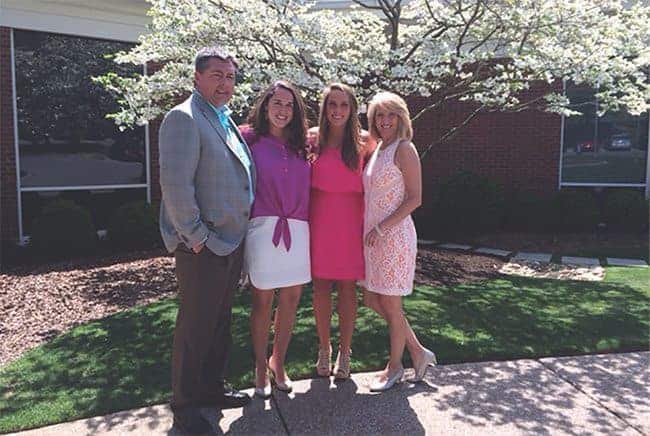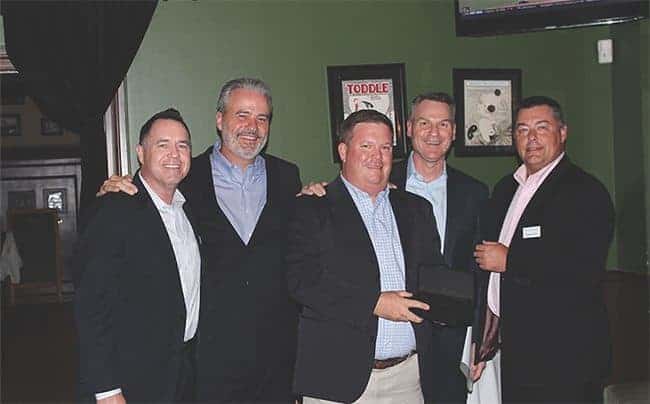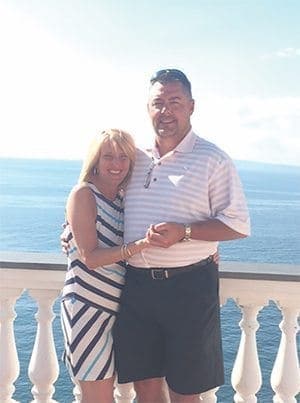Core values inspire Smith
Southerland top exec, ISPA chair attributes success to honesty, teamwork, work-life balance
BY DOROTHY WHITCOMB
Bryan Smith, president and chief executive officer of Southerland Inc., wonders if he perhaps is a bit too honest, brutally honest at times. “I’m very transparent and one of those people who is probably honest to a fault,” he says. “Don’t ask me if you don’t want to know what I think.”
Honesty is a core value with Smith, and one he applies as liberally to himself as to his business and personal relationships. Commitment is another. Taken together, these values have helped Smith, who has headed the Nashville, Tennessee-based mattress manufacturing company since 2013, to build a thriving business and fulfilling personal life.

Bryan Smith, president and chief executive officer of Nashville, Tennessee-based Southerland Inc., is dedicated to balancing time between work and family. Pictured (from left): Bryan, daughters Sloan and Kelli, and his wife, Beth.
Smith grew up in Dickson, Tennessee. His dad worked for the railroad, and his mom came from a farming family. While in high school, he spent his summers working with his father on the railroad, an experience that shaped the way he thought about the kind of life he wanted to lead.
“I think that the trials and hardships that we face as individuals shape us for the rest of our lives,” Smith says. “My dad worked in the track department. Think three guys standing around with spiking hammers swinging them all day. I didn’t know what I wanted to do with my life, but I knew I didn’t want to do that.”
Smith saw education as the path forward and brought the work ethic that he learned from his parents to a commitment “to get an education in something that I wanted to do for the rest of my life,” he says.
After graduation, Smith joined Byrd Proctor & Mills LLD, a Nashville-based public accounting firm and became a partner six years later. Southerland was one of the firm’s clients, and Smith represented the company and the Southerland family as their CPA and financial adviser.
In the mid-1990s, Smith developed the succession plan that enabled Herman Southerland, the nephew of founder J.D. Southerland, to acquire a majority share in the company. In 1996, Smith joined the company as its chief financial officer and in 1999 was appointed president.
He served in both roles simultaneously until 2010, when Southerland was acquired by Argosy Partners IV LLC, a Philadelphia-based private equity and management company. After the acquisition, Smith again served as CFO, resuming the joint responsibilities of president and CFO in 2012. A year later, he became the company’s president and CEO.
Quality-driven business model
Southerland produces its products at four manufacturing facilities, with a combined square footage of about 400,000 square feet. Two of the facilities are located in Nashville and the others are in Phoenix and Oklahoma City. The company has a controlling interest in American Adjustables, an adjustable base manufacturer in Nashville, and operates Nashville-based Southerland Transport as a wholly owned subsidiary.
“Southerland Transport is a licensed common carrier,” Smith says. “Outbound freight is dedicated to Southerland products, but on the return trips, we haul freight for other companies to defray shipping costs.”
In addition to its own nine mattress collections and the private-label products it manufactures, Southerland is an Englander licensee. The company also offers nine models of adjustable bases through American Adjustables.
During his tenure at the 123-year-old company, Smith says, “we have executed our business model by improving our quality, adding higher-end product lines, growing our sales by more than 20% and developing employees—our most important resource.”
He is most proud, however, of building what he sees as a stellar management team, which includes Barry Elkins, CFO; Don Pflug, executive vice president of operations; and Greg Wilder, executive vice president of sales. “I’ve surrounded myself with a team that is one of the best in the country,” Smith says. “They are the heartbeat of our company and drive our business forward.”

Bryan Smith, head of Nashville-based Southerland Inc., is proud of his management team, which includes (from left) Greg Wilder, executive vice president of sales; Barry Elkins, chief financial officer; Brian Harris, account manager; Don Pflug, executive vice president of operations; and Smith, president and chief executive officer.
Involvement means opportunity
Smith believes the International Sleep Products Association serves a similar function for the bedding industry. He recently became chair of the ISPA Board of Trustees but has been involved with the association since the late 1990s.
“I look at ISPA as being the steward of the industry,” he says. “Involvement with the organization gives you the opportunity to help shape the future of the industry and make sure that it is sustainable for years to come. I also believe that ISPA is an important factor in our own business’s growth.”
Smith has a clear-eyed view of the bedding industry. He sees strength in the industry’s roots in family-owned businesses and problems in its continuing struggle to earn consumer confidence.
“In a world in which roll-ups and private equity are changing the face of the industry, there still are a lot of people who come out of a 110-year history of family-owned businesses and are willing to come together and grow the industry,” he says. “We need to become much more credible at retail, however. We are still perceived as not being trustworthy and actually not providing what we say is in the beds to consumers.”
Another side of Smith
The ‘Golden Circle’
What do Southerland, Apple, the Wright brothers and Martin Luther King Jr. have in common? Smith believes it’s the “Golden Circle,” a way of looking at life, business and leadership that was codified by Simon Sinek in a 2010 TED Talk. (An acronym for technology, entertainment and design, TED is a nonprofit organization devoted to spreading ideas, usually in the form of short, powerful talks.) Sinek, an author, speaker and consultant who focuses on leadership and management issues, describes the Golden Circle as “a naturally occurring pattern, grounded in the biology of human decision making, that explains why we are inspired by some people, leaders, messages and organizations over others.”
Inspiration and success, Sinek says—and Smith believes—come when people and organizations focus on why they do something rather than what they do and how they do it. The “why” is never about making a profit—that’s a result. According to Sinek, it’s about purpose, cause and beliefs.
“The Southerland Way is really defined by the Golden Circle,” Smith says. “It provides the vision for who we want to be and is underpinned by the values that move us forward.”
Managing stress
Smith routinely works 12-hour days and for much of his professional life worked weekends, as well. Stress was a constant companion and work-life balance an elusive goal. A career change helped with part of the problem. “I made the transition from being a certified public accountant to working for the Southerland family to try to find balance in my life,” he says. “I just wasn’t going to work those hours anymore.”
The transition helped, but the stress remained. Smith says: “I went through life feeling as if I was overwhelmed with stress. Twelve years ago, I made a commitment to myself. Now, the first thing I do every morning is a devotional during which I read a chapter out of the Bible. Once I started doing that, I began to find peace. It keeps me grounded.”
A philosophy to live by
Smith has a three-step decision-making process that he also encourages Southerland employees to use. “If you look upward (toward God), then outward (to the community) and then inward to make a decision, you’ll make a better one,” he says. “Self-centered decisions usually are not good ones.”
The importance of golf
Don’t tell Smith that golf is just a game. It’s so much more for him. “I like to compete, so every outing is a competition against myself and each time I play I have an opportunity to get better,” he says. “Golf is also a distraction for me. I can go out and immerse myself in the game and let everything go for four hours.”
Good advice
The best advice Smith says he ever received came from his grandfather, who told him to “remember where you came from.” It stuck with him and still guides his thinking today. “I have been blessed beyond my wildest imagination with an awesome wife, two wonderful daughters and financial stability,” he says. “It’s easy to become a little spoiled and entitled, so I try—and the key word is ‘try’—to stay as grounded in my roots and beliefs as possible.”
Giving back
Smith finds that he is happiest when he is giving back to others through mentoring. “I have done both personal and organizational mentoring, most recently with Lipscomb University (in Nashville) where they matched me with students with similar interests,” he says. “I coached a girls basketball team for more than 10 years, and some of the most fulfilling moments I have had in my life have come from helping the young ladies I coached, not just with basketball, but with overcoming adversities in their lives. I’m in search of what I feel my purpose is in life, and the more I find purpose, the better I feel.”




